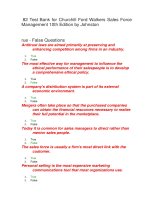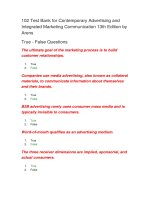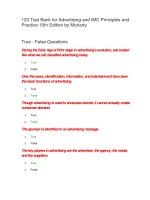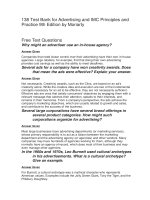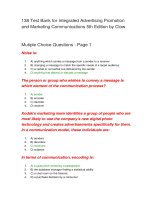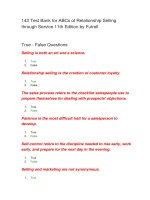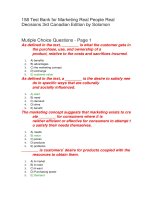Test bank for personal finance turning money into wealth 5th edition by keown
Bạn đang xem bản rút gọn của tài liệu. Xem và tải ngay bản đầy đủ của tài liệu tại đây (69.17 KB, 16 trang )
Full file at />Chapter 1 The Financial Planning Process
1.1 Facing Financial Challenges
1) Once a sound financial plan is in place , there should be no need to ever change it.
Answer: FALSE
Diff: 1
Topic: The Financial Planning Process
2) When comparing two different investment opportunities the investor should always choose the
investment that minimizes the total amount of taxes paid.
Answer: FALSE
Diff: 2
Topic: Minimization of Taxes
3) Being financially secure involves balancing what you earn with
A) your investments.
B) what you spend.
C) your retirement plans.
D) your current level of debt.
Answer: B
Diff: 1
Topic: Financial Planning
4) In order for your financial plan to be realistic and attainable it needs to be based upon your
A) budget.
B) income level.
C) number of tax deductions, exemption, exclusions, and credits.
D) balance sheet.
E) none of the above
Answer: B
Diff: 2
Topic: Financial Planning
5) Which of the following could one accomplish with personal financial planning as outlined in
the text?
A) minimize the chances of personal bankruptcy
B) having enough money for a comfortable retirement
C) being able to deal with unplanned health issues or an early death
D) minimizing your tax payments to Uncle Sam
E) all of the above
Answer: E
Diff: 2
Topic: Financial Planning
buy this full document at
Full file at />6) What are common factors found in an effective financial plan?
A) effective financial plans should be flexible to allow for changes in your situation
B) effective financial plans should provide sufficient liquidity to meet unexpected needs
C) effective financial plans should provide insurance protection from catastrophic events
D) effective financial plans should help you minimize paying taxes
E) all of the above are necessary in an effective financial plan
Answer: E
Diff: 1
Topic: Financial Planning
7) This course/text will assist you in accomplishing six financial objectives. What are they?
Answer:
1. Manage the unplanned.
2. Accumulate wealth for special expenses.
3. Realistically save for retirement.
4. Cover your assets.
5. Invest intelligently.
6. Minimize your payments to Uncle Sam.
Diff: 2
Topic: Financial Planning
1.2 The Personal Financial Planning Process
1) Today, most Americans over the age of 65 have adequate savings and income available to
them during retirement.
Answer: FALSE
Diff: 1
Topic: Financial Planning Life Cycle
2) The amount of current income that you earn today isn't relevant to setting your long term
goals for the future.
Answer: FALSE
Diff: 1
Topic: Financial Planning
3) A financial plan is only concerned with your future earnings and expenses. An examination of
your current financial situation is not so important.
Answer: FALSE
Diff: 1
Topic: The Financial Planning Process
buy this full document at
Full file at />4) Which one of the following is not one of the five basic steps in personal financial planning?
A) Evaluate your financial health.
B) Define your financial goals.
C) Develop a plan of action.
D) Let an accountant review your plan.
E) Implement your plan.
Answer: D
Diff: 2
Topic: The Financial Planning Process
5) The first step in evaluating your financial health consists of
A) preparing a personal balance sheet.
B) determining what you are worth.
C) preparing a personal income statement.
D) determining where your money comes from and where it goes.
E) all of the above
Answer: E
Diff: 1
Topic: The Financial Planning Process
6) The purpose of reviewing your progress, reevaluating, and revising your plan (step 5) is to
A) your financial needs change over your lifecycle.
B) your employment situation changes from time to time
C) your net worth will change over time
D) your family situation may change from time to time
E) all of the above are good reasons to periodically review your financial plan
Answer: E
Diff: 3
Topic: The Financial Planning Process
7) Which of the following step(s) are not considered to be part of the personal financial planning
process as outlined in the text?
A) Evaluate your financial health.
B) Define your financial goals.
C) Develop a plan of action.
D) Implement your plan.
E) none of the above
Answer: E
Diff: 2
Topic: The Financial Planning Process
buy this full document at
Full file at />8) Suppose that you just completed your first year of college with $11,000 in loans and plan to
borrow the maximum each year from now until graduation. You have never accounted for the
way you spend your money, do not have a budget, and want to insure that you will be able to
repay your loans after college. What is the most important thing you can do right now?
A) Talk to your parents about an allowance.
B) Visit your career counselor at school.
C) Ask a friend who took the Personal Finance course for advice.
D) Immediately begin to develop a personal financial plan.
Answer: D
Diff: 3
Topic: Financial Planning
9) Suppose you have just retired, have accumulated many luxury goods over the years, still owe
a mortgage on your home, still have unpaid travel expenses on your credit cards, and have helped
your adult children financially. Your spouse has recently passed away, and you miss their
contribution to the household income. Which step in the personal financial planning process have
you neglected?
A) Develop your financial health.
B) Define your financial goals.
C) Develop a plan of action.
D) Implement your plan.
E) Review your progress, reevaluate, and revise your plan.
Answer: E
Diff: 2
Topic: Financial Planning
10) While reviewing your current financial plan, you discover that you most likely won't achieve
your long term financial goals. What should you do now?
A) Look at increasing your income
B) Look at cutting back on your expenses
C) Look at revising your goals
D) all of these would be realistic things to do
Answer: D
Diff: 3
Topic: The Financial Planning Process
11) Step 3 of the personal financial planning process is to "Develop a Plan of Action." Which of
the following is not one of the "common concerns" that should guide all financial plans?
A) flexibility
B) long-term profitability
C) liquidity
D) protection
E) minimization of taxes
Answer: B
Diff: 2
Topic: The Financial Planning Process
buy this full document at
Full file at />12) The term that considers having money readily available when you need it is the concept of
A) flexibility.
B) liquidity.
C) accessible savings.
D) cash availability.
E) none of the above
Answer: B
Diff: 1
Topic: Financial Planning
13) Describe the five steps in the personal financial planning process.
Answer:
Step 1: Evaluate your financial health by examining your current financial situation. Look at
your whole financial picture. Keep records and determine your net worth.
Step 2: Define your financial goals by describing what, when, and how much you want to do.
Written goals will draw you to them.
Step 3: Develop a plan of action to reach your goals. Don't just think about goals decide how
you will carry them out! Let flexibility, liquidity, protection, and minimization of taxes guide
your plan.
Step 4: Implement your plan by carrying it out just do it! Stick to your plan.
Step 5: Review your progress, reevaluate, and revise your plan periodically and as needed.
Diff: 2
Topic: The Financial Planning Process
14) Why do people need to plan their finances?
Answer: Without financial planning we will suffer and be at a loss both in the present time and
in the future. Too many people reach retirement broke and in poor health. Their financial means
are so limited they live out a meager existence and become a burden upon family and society.
Life is meant to be enjoyed and only by planning can we do that. Because it is always easier to
spend than save, financial planning is a must!
Diff: 2
Topic: Financial Planning
15) Elaborate upon the four common concerns that should guide all financial plans.
Answer: Your financial plan should be flexible enough to respond to changes in your life and
unexpected events. Planning must allow some funds to be liquid to allow access to money when
you need it quickly. Plan for protecting your assets and yourself with adequate insurance. Finally,
your financial plan should take taxes into account to pay as little as possible.
Diff: 2
Topic: The Financial Planning Process
buy this full document at
Full file at />1.3 Establishing Your Financial Goals
1) Proper financial planning can help you use your current income to achieve your long term
financial goals
Answer: TRUE
Diff: 1
Topic: Financial Planning
2) The major reason to make a financial plan is to
A) account for your spending.
B) see where you are over or under spending.
C) achieve your financial goals.
D) allow for a surplus.
E) serve as a tax planning guide.
Answer: C
Diff: 1
Topic: Financial Goals
3) What is the significance of the financial life cycle?
A) to help you to compare your situation with other people's situation
B) to better understand how your financial needs will most likely change over time
C) to allow you to be more proactive in dealing with with expected changes in the future and
take steps today to prepare for them.
D) to help you realize that your original plan is sufficient and doesn't need to change
E) both B and C are significant aspects of the financial life cycle
Answer: E
Diff: 3
Topic: Financial Planning Life Cycle
4) Which of the following typically occur(s) during stage one of the financial life cycle?
A) initial goal setting
B) insurance planning
C) saving for goals
D) home purchase
E) all the above
Answer: E
Diff: 2
Topic: Financial Planning Life Cycle
buy this full document at
Full file at />5) Suppose that you are a 20-year-old college student. What stage of the financial life cycle are
you currently in?
A) stage 1: wealth accumulation
B) stage 2:: the golden years
C) stage 3: the retirement years
D) stage 4: the formative years
E) stage 5: the educational years
Answer: A
Diff: 2
Topic: Financial Planning Life Cycle
6) After retirement starts, your most important financial decisions should revolve around
A) maintaining a regular pattern of saving.
B) decisions about the diversification of risks.
C) estate planning.
D) effects of inflation.
Answer: C
Diff: 2
Topic: Financial Planning Life Cycle
7) What should you do with your goals on a frequent basis throughout your lifetime?
A) Prioritize them.
B) Modify them.
C) Put them in writing.
D) Let an advisor help.
E) all of the above
Answer: E
Diff: 3
Topic: Financial Goals
8) An economic condition in which rising prices reduce the purchasing power of money is
termed
A) deflation.
B) inflation.
C) stagflation.
D) cash erosion.
E) none of the above
Answer: B
Diff: 1
Topic: Inflation
buy this full document at
Full file at />9) When you are involved in ________ planning, you are planning for your eventual death and
the distribution of your wealth onto your heirs.
A) long term planning
B) beneficiary planning
C) estate planning
D) actuarial planning
E) none of the above
Answer: C
Diff: 1
Topic: Estate Planning
10) When would be a good time to review and possibly adjust an effective financial plan?
A) a really effective financial plan doesn't need to be adjusted.
B) when you get married
C) when you have children
D) when the stock market goes up
E) both B and C are correct answers
Answer: E
Diff: 1
Topic: Financial Planning
11) Explain the essence and importance of each of the stages in the financial life cycle.
Answer: The overall financial life cycle allows you to better understand the timing and areas of
financial concern that you'll probably experience. It allows you to focus on those concerns earlier
and to plan ahead to avoid future financial problems.
Stage 1 is a time of wealth accumulation, initial goal setting, home purchase, family formation,
insurance planning, saving for goals, and some tax and estate planning. It's a time to develop a
regular pattern of saving because it's tempting to spend rather than save. We are ages 18 through
54 in this stage.
Stage 2 covers ages 55 to 64 or the golden years approaching retirement. This is a transition from
the earning years when you will earn more than you spend. Much of the financial activities will
be spent in fine tuning. We put an emphasis on tax and estate planning, paying ourselves first,
and insurance planning.
Stage 3 consists of the retirement years, for most people age 65 and older. We reap the benefits of
sound planning or the losses from unsound planning. You will attempt to ensure continued
financial security and perhaps work part-time.
Diff: 2
Topic: Financial Planning Life Cycle
buy this full document at
Full file at />12) Differentiate between short-term, intermediate, and long-term goals. Give examples.
Answer: Short-term goals can be accomplished within one year, such as taking a vacation.
Intermediate goals take between one and ten years to reach, such as saving for a college
education or the down payment on a house. Long-term goals take more than ten years to
accomplish. Retirement planning is a common long-term goal.
Diff: 3
Topic: Financial Goals
1.4 Thinking About Your Career
1) A well educated and trained employee is virtually guaranteed job security in todays
corporations. Therefore he or she doesn't need to worry about keeping their skills updated and
current.
Answer: FALSE
Diff: 1
Topic: Career Choices
2) The most important aspect of choosing a career is the amount of income that career will
generate over your lifetime.
Answer: FALSE
Diff: 1
Topic: Career Choices
1.5 What Determines Your Income?
1) Education and specialized skills required for a job are important determinants of the income
potential associated with that job.
Answer: TRUE
Diff: 1
Topic: Determinants of Income
2) What is the main factor in determining your potential income level?
A) education and skills that you have attained
B) who you know in your company administration
C) your age and years of employment
D) the size of the company you work for
Answer: A
Diff: 1
Topic: Determinants of Income
buy this full document at
Full file at />3) Which of the following statements applies to obtaining an undergraduate college degree?
A) They are expensive and rarely pay off in increased earnings.
B) Seventy percent (70%) of wealthy householders had earned a college degree.
C) Undergraduate education is the single best investment any one could make.
D) There is no relationship between personal wealth and earning a college degree.
E) both B and C above
Answer: E
Diff: 2
Topic: Determinants of Income
4) Probably the most important determinant of your future earnings will be
A) your highest level of education obtained.
B) the size of the company where you will work.
C) your seniority with your company.
D) joining a labor union.
Answer: A
Diff: 2
Topic: Determinants of Income
5) What is the relationship between earnings, education, and standard of living?
Answer: There is a direct relationship between earnings and standard of living and education.
The more education an individual has, the more he or she will earn in general and thus enjoy a
higher standard of living. The opposite holds true also. The less education one has the lower the
earnings and standard of living.
Diff: 2
Topic: Determinants of Income
1.6 Ten Principles of Personal Finance
1) Most individuals will reach their financial goals without planning or budgeting.
Answer: FALSE
Diff: 1
Topic: Principle 2: Nothing happens without a plan
2) All else equal, an increase in inflation will cause investors to require a higher rate of return on
an asset.
Answer: TRUE
Diff: 1
Topic: Risk and Return Go Hand in Hand
3) Investing half of your money in Pepsi Cola stock and the other half in Coca Cola stock is a
good diversification strategy.
Answer: FALSE
Diff: 1
Topic: Risk and Return Go Hand in Hand
buy this full document at
Full file at />4) Factors that impact the returns of all assets in the market are a type of risk that can be
eliminated through diversification.
Answer: FALSE
Diff: 1
Topic: Principle 8: Risk and return go hand in hand
5) Which of the following is outlined in the text as reason(s) why many people do not have an
adequate financial plan?
A) For most people it is easier to spend than save.
B) Procrastination can affect everyone.
C) Many of us lack the proper knowledge.
D) There is never enough time for organizing and planning.
E) all of the above are common excuses for not planning.
Answer: E
Diff: 3
Topic: Financial Planning
6) Chapter 1 discusses ten principles that form the foundation of personal finance. The principle
that considers the fact that one expects to earn additional return for increasing investment risk is
the ________ principle.
A) risk and return go hand in hand.
B) mind games and your money
C) nothing happens without a plan
D) the best protection is knowledge
Answer: A
Diff: 2
Topic: Principle 8: Risk and return go hand in hand
7) Chapter 1 discusses ten principles that form the foundation of personal finance. The concept
that emphasizes that people should not put all their eggs in one basket is the ________ principle.
A) time dimension of investing
B) curse of competitive investment markets
C) diversification reduces risk
D) farmers analogy
E) liquidity is first
Answer: C
Diff: 2
Topic: Principle 8: Risk and return go hand in hand
buy this full document at
Full file at />8) Chapter 1 discusses ten principles that form the foundation of personal finance. The principle
that suggests that you should make your financial security your most important priority is the
________ principle.
A) pay yourself first
B) money isn't everything
C) time value of money
D) time dimension of investing
E) none of the above
Answer: A
Diff: 2
Topic: Principle 10: Just do it
9) Chapter 1 discusses ten principles that form the foundation of personal finance. The principle
that considers the value of compound interest is the ________ principle.
A) all risk is not equal
B) time dimension of investing
C) competitive inflation adjustment
D) time value of money
E) none of the above
Answer: D
Diff: 2
Topic: Principle 3: The time-value-of-money
10) Chapter 1 discusses ten principles that form the foundation of personal finance. The principle
that considers the importance of insurance is the ________ principle.
A) agency problem beware the sales pitch
B) all risk is not equal
C) time value of money
D) protect yourself against major catastrophes
E) none of the above
Answer: D
Diff: 2
Topic: Principle 7: Protect yourself against major catastrophes.
11) The sub-prime mortgage mess is dominating the news. Many people signed up for adjustable
rate mortgages and now they can't afford their payments. Many of these people were misled by
the lender. Which financial principle from chapter one most applies?
A) The best protection is knowledge
B) Mind games and your money
C) Stuff happens, the importance of liquidity
D) The time-value-of-money
Answer: A
Diff: 3
Topic: Principle 1: The best protection is knowledge
buy this full document at
Full file at />12) In Chapter One, Principle Three deals with the time value of money. Why is this principle so
important to financial planning?
A) It allows us to determine how much money we will need to achieve our future goals.
B) It shows us the impact of inflation on our money over time.
C) It helps us determine our savings needs today in order to meet our retirement goals.
D) It shows us how important time and interest rates are in accumulating wealth.
E) all of the above are important in financial planning.
Answer: E
Diff: 3
Topic: Principle 3: The time-value-of-money
13) Abraham started saving $800 per month for his retirement when he was fifty-five years old
and he is still working today at age seventy. Tawnya started saving $50 per month when she was
twenty-two years old and she retired at age sixty-five and is enjoying her retirement years. What
financial principle(s) did Tawnya understand very well?
A) Just do it.
B) Time value of money
C) Risk and return go hand in hand
D) Nothing happens without a plan
E) all of the above are correct answers
Answer: E
Diff: 2
Topic: Ten Financial Principles
14) Murphy's Law says whatever can go wrong, will go wrong, at the worst possible time. What
financial principle is best for dealing with Murphy's Law?
A) Time value of money
B) Risk and return go hand in hand
C) Stuff happens, the importance of liquidity
D) none of the above are correct answers
Answer: C
Diff: 3
Topic: Principle 5: Stuff happens: the importance of liquidity
15) Maiko's car just broke down and she had to sell her jewelry to pay for the repairs. What
financial principle best applies to her situation?
A) Knowledge is the best protection
B) Waste not, want not, smart spending matters
C) Risk and return go hand in hand
D) Stuff happens, the importance of liquidity.
Answer: A
Diff: 3
Topic: Principle 5: Stuff happens: the importance of liquidity
buy this full document at
Full file at />16) Jose meets his friends at Starbucks Coffee Shop every day after work. They discuss their
plans for their monthly trip to Las Vegas. Jose has a credit card balance of $12,000 dollars and
he doesn't have any money in savings. What financial principle from Chapter One does Jose
need to pay better attention to?
A) Just do it
B) Nothing happens without a plan
C) Mind games and your money
D) Waste not, want not, smart spending matters
Answer: D
Diff: 2
Topic: Principle 6: Waste not, want not, smart spending matters
17) Emir likes to go to the mall when the weather is bad. Today he bought a new Plasma TV that
he saw on sale. The Sales Clerk told him it was a very good buy. What financial principle from
Chapter One does Emir need to pay better attention to?
A) Mind games and your money
B) Stuff happens, the importance of liquidity
C) Waste not, want not, smart spending matters
D) none of the above apply to Emir
Answer: C
Diff: 2
Topic: Principle 6: Waste not, want not, smart spending matters
18) Laticia is twenty-two years old and she has all of her savings in a Certificate of Deposit at
the bank that currently pays 3 percent. She hopes to use her savings for a down payment on a
new house in ten years. Inflation in house prices in her area has averaged 5 percent per year.
What financial principle from Chapter One does she need to pay better attention to?
A) Nothing happens without a plan
B) Waste not, want not, smart spending matters
C) Risk and return go hand in hand
D) all of the above are correct
Answer: C
Diff: 3
Topic: Principle 8: Risk and return go hand in hand
19) Charlie is sixty-four years old and is looking forward to his retirement next year. He
currently has all of his 401K retirement money invested in the stock market. What financial
principle from Chapter One does he need to understand better?
A) Nothing happens without a plan
B) Knowledge is the best protection
C) Stuff happens, the importance of liquidity
D) Risk and return go hand in hand.
Answer: D
Diff: 3
Topic: Principle 8: Risk and return go hand in hand
buy this full document at
Full file at />20) Recently, the common stock in Bear Stearns Company fell from $80 per share to $2 per share
in less than two weeks. Many of the employees had all of their retirement money invested in
Bear Stearns common stock. What financial principle from Chapter One did they need to
understand better?
A) Risk and return go hand in hand
B) Nothing happens without a plan
C) The time value of money
D) Just do it
Answer: A
Diff: 3
Topic: Principle 8: Risk and return go hand in hand
21) Bert bought a used car last month for $1200. He just found out he needs a new transmission
that will cost $1800 to install. He is asking you for advice as to what he should do. What
financial principle from Chapter One would you use to base your advice on?
A) Waste not, want not, smart spending matters
B) Mind games and your money
C) Protect yourself from major catastrophes
D) None of the above would be correct
Answer: B
Diff: 3
Topic: Principle 9: Mind games and your money
22) Maria is very proud of herself for having $3,000 in her savings account that pays 3 percent
interest. She currently has a balance of $1,800 on her credit card account. What financial
principle from Chapter One would you use to give her good advice?
A) Just do it
B) The time value of money
C) The best protection is knowledge
D) Mind games and your money
Answer: D
Diff: 3
Topic: Principle 9: Mind games and your money
23) Ingrid is complaining to you that she never has any money left over at the end of the month
for savings. She says that something always comes up at the last minute that prevents her from
saving the amount she put in her budget for savings. What financial principle from Chapter One
does she need to pay closer attention to?
A) Nothing happens without a plan
B) Stuff happens, the importance of liquidity
C) Risk and return go hand in hand
D) Just do it
Answer: D
Diff: 3
Topic: Principle 10: Just do it
buy this full document at
Full file at />24) Kareem is seventy years old and works at a Restaurant. Most of his friends are retired and
enjoying their retirement years comfortably. Which financial principle from chapter one most
likely applies to Kareem?
A) Nothing happens without a plan
B) Mind games and your money
C) Time value of money.
D) Just do it.
E) all except B would apply
Answer: E
Diff: 3
Topic: Ten Financial Principles
buy this full document at
